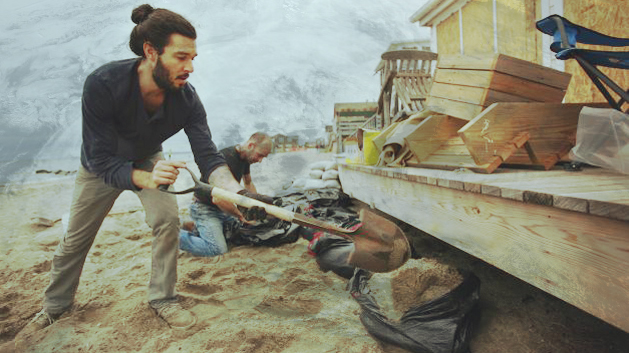
Like many Americans this week, I sat safely inside as Hurricane Sandy swept over the East Coast, terrorizing neighborhoods and flooding city streets. When I walked outside Tuesday to check the damage on my Washington, D.C., house, I felt relieved to find only a large puddle and a few fallen branches.
Millions of others were not so lucky.
At least 157 people have died—67 in the Caribbean, 88 in the U.S. and two in Canada. That means hundreds of fathers, mothers, sisters, brothers and friends lost loved ones. Although possessions cannot compare to the value of human life, experts estimate the economic losses to have topped $50 billion, which could take years to restore.
While the hurricane has passed, a different storm has begun to rage in our nation’s capital. Critics on both sides of the political spectrum have lashed out at the presidential candidates for leveraging the storm’s destruction for their campaigns. President Obama has been attacked for visiting affected areas in New Jersey for the sake of attracting voter attention and boosting his image, while presidential-contender Mitt Romney has been chastised for changing his mind to support disaster-relief agency FEMA—even though he said he supported its elimination in 2011.
I’ll be the first to admit I hate hypocrisy. As a middle-class twentysomething living in a city, I breathe cynicism like it’s oxygen—so mocking both candidates for superficiality comes as a thoughtless response to me.
Yet as I take a step back, I recognize both Romney and Obama would receive criticism regardless of their actions. If Obama had not traveled to New Jersey, the media would have been in an uproar, comparing him to President Bush and his delayed concern for New Orleans after Hurricane Katrina. If Romney had not changed his mind on FEMA, critics would have condemned his anti-relief sentiments. Both Obama and Romney are politicians, and politicians have to politick. That’s their job, after all.
But as the footage of the real aftermath of Hurricane Sandy came into view, the nation and its citizens and leaders alike have quickly realized this is not a political platform, but a human crisis.
And in light of the wreckage that has been done to so many homes and lives, political finger-pointing accomplishes nothing but empty noise. Instead of politicizing this disaster, we would do better to first take a good, critical look at ourselves—checking the pulse on our own compassion and thoughtfully considering how we can help.
Few of us have seriously empathized with those hurt by the storm. When Jesus encountered disaster, sickness or pain, He always internalized the problem before He sought to fix it. He spoke with the woman at the well, touched the blind man’s eyes and wept at Lazarus’s funeral before raising him from the dead. We, too, need to recognize the severity of the destruction. Once we experience this brokenness, we can develop the right perspective from which to respond.
So, let’s consider something together: What would it look like to wisely and effectively help those affected by the storm?
Reaching out may involve giving financially to a reputable charity, volunteering in a clean-up effort, praying for the families who’ve lost loved ones or maybe a combination of all three. Regardless, as Christ-followers, we should respond sacrificially without concern for appearances.
When I was in high school, three major hurricanes hit my hometown of West Palm Beach, Fla. within the span of a few months. Aside from the fact that a tree fell into my bedroom and almost crushed me, my house lost power for three weeks in the dead heat of summer. I’ll never forget when a friend picked me up, took me to an air-conditioned restaurant and asked me, “How are you doing?” He did not have an agenda or even an underlying motive, but in the moment, it was the most loving thing anyone could have done.
This reminds me that acts of kindness do not need to be flashy or elaborate. In fact, the most profound service often lacks formal organizational support and may even go unnoticed, but I truly believe there is wisdom in not allowing your right hand to know what you left hand is doing.
As Brennan Manning says, “Do the truth quietly without display.”
Should politicians leverage natural disasters for the benefit of their own image? Of course not. But in a time when our nation is sharply divided by party affiliation, we should not add fuel to the fire by politicizing the storm and criticizing the candidates’ every move. Rather, we should lovingly serve those affected in such a way that reveals God’s grace, especially when many may struggle to see it.
Let the hurricane serve as a wake-up call that people have needs and you may be able to help them. Take a moment today and consider how you can help someone affected, regardless of on what side of the political line they stand.






















